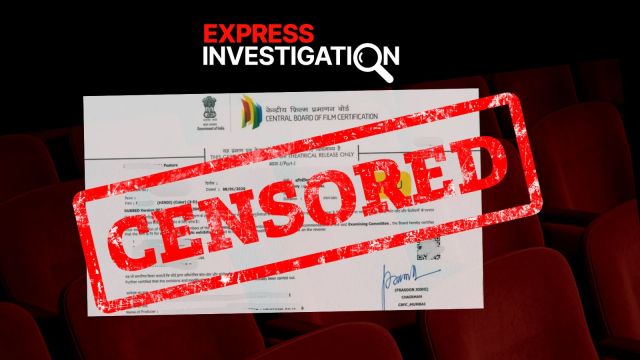Late last week, India nominated the globally acclaimed Homebound, which lists legendary American filmmaker Martin Scorsese as an executive producer, as its official entry for Oscars 2026. Behind the curtains, the announcement marked another twist in the movie’s turbulent journey within its own country — marred by a series of cuts that appeared to rattle the film’s makers so much they omitted Scorsese’s name from the first set of posters before restoring it in later versions.
For three years, a film on Punjab’s days of militancy, Punjab ’95, starring global star Diljit Dosanjh is in deep freeze after the director put his foot down to the board’s demand for over 100 cuts.
These are but only two examples of a controversial decision-making process that has set off divisions within the Central Board of Film Certification (CBFC), a statutory body under the Ministry of Information & Broadcasting. And cast a long regulatory shadow on the Indian film industry as it aspires to be a global player and rope in non-Indian sponsors and patronage.
* Under the Cinematograph (Certification) Rules 2024, the board must meet once every quarter. But the 12-member board last met six years ago on August 31, 2019.
* The last annual report on the CBFC website dates back to 2016-17. Under the rules, the board is required to publish and submit an annual report to the I&B Ministry.
* The board was last reconstituted on August 1, 2017, “for a period of three years or until further orders, whichever is earlier”. There have been no renewals of tenure after the mandated period ended in 2020, raising questions over the current board’s legal status.
Story continues below this ad
“We don’t know if we are still members of the board or if the board itself is functioning legally,” said a member appointed in 2015.
“Our tenures are time-bound (three years) but no one has been officially reappointed since 2017. Even my identity card was not replaced after its validity expired. There is no (board) meeting, no annual report, no work for most of us, no appellate authority (for filmmakers)… CBFC is running at its chairman’s pleasure,” the member said.
Asked about these irregularities, an I&B Ministry spokesperson told The Indian Express: “The Board has been functioning in accordance with the Cinematograph (Certification) Rules, 1983 and 2024. The CBFC submits its annual report material to the Ministry each year, which is then included in the Ministry’s consolidated annual report.”
On CBFC not conducting mandatory quarterly board meetings since August 2019, the I&B spokesprson said: “The CBFC’s online certification system, e-cinepramaan, launched on 01.04.2017, has been operating smoothly, enabling fully online certification and payments, with a focus on transparency and ease of doing business.”

Fallout of a ‘favoured few’
Story continues below this ad
On August 11, 2017, lyricist Prasoon Joshi was appointed chairperson of the 12-member board of actor Gautami Tadimalla; author Narendra Kohli (since deceased); film director Naresh Chander Lal; musician Neil Herbert Nongkynrih (since deceased); film director Vivek Agnihotri; theatre director Waman Kendre; actor Vidya Balan; filmmaker T S Nagabharana; editor Ramesh Patange; actor Vani Tripati Tikoo; actor and director Jeevitha Rajasekhar; and playwright Mihir Bhuta.
A number of film professionals said that the longest-serving CBFC chairperson has involved only a select few members in the board’s activities in recent years.
According to them, Kendre, Nagabharana and, to some extent, Patange have been heading most of the board’s Revising Committees (RC). Chaired by board members, these are powerful panels that decide on appeals filed by applicants who are not satisfied with decisions taken by Examining Committees (EC) at the first level of certification in the CBFC’s nine zonal offices.
The Board has around 1,000 advisory panel members who are picked to constitute these committees.
Story continues below this ad
The fallout is evident — as the case of Homebound illustrates.
Directed by national award-winner Ghaywan, backed by Karan Johar’s Dharma Productions and scheduled for release in India on September 26, Homebound received a warm reception at Cannes and Toronto. And yet, it was “destroyed in parts”, said a unit member, by the cuts and changes imposed at home.
Ghaywan did not respond to requests for comments, but sources in Dharma said the film waited nearly three months for a screening date at CBFC. Then, after a “very hostile” screening, the makers were asked to modify or remove multiple caste references, they claimed.
“The director was distraught but the producers reminded him of the ordeal faced by our Dhadak 2 (on caste and social discrimination), which suffered a significant delay in release (and was eventually granted an U/A certificate with 16 cuts in May),” said a member of the production team.
Story continues below this ad
Added a CBFC source: “The board has multiple members in Mumbai but Nagabharana was called from Bengaluru to head the RC (for Homebound). He tore into Neeraj…to justify all the cuts and changes made on caste references.”
So much so, the Homebound poster released on September 13, a day after it was granted a ‘UA16+’ certificate, did not mention Scorsese who had helped Ghaywan with the final edits. Three days later, Scorsese was credited as ‘executive producer’ on a new set of posters. “I loved the story, the culture and was willing to help. Neeraj has made a beautifully crafted film that’s a significant contribution to Indian cinema,” Scorsese had said while coming on board Homebound in April.
When asked about Homebound, Nagabharana declined to comment saying these were “internal matters” of the board. On heading RCs in Mumbai, the Bengaluru-based director said: “What’s wrong with that? I don’t know if local (CBFC) members were available or not. But as a member, I can be in any RC anywhere in India.”
Dharma Productions and Scorsese did not respond to requests from The Indian Express for comment.
Story continues below this ad
According to several filmmakers, a crucial turn for the CBFC was abolition of the Film Certification Appellate Tribunal in April 2021 in order to consolidate powers with the High Courts. “Going to the High Court is costly and takes time. And when you get a favourable view from the court, there is pressure outside to withdraw the case. No professional producer can afford taking them on for the sake of a single film,” said an actor.
‘Shocks’ in the cutting room
The tale of the yet-to-be-certified Punjab ’95 is another case in point.
Director Honey Trehan’s film, based on the life of rights activist Jaswant Singh Khalra with popstar Diljit Dosanjh in the lead role, was submitted to the CBFC in December 2022. When the Board asked for multiple cuts, the Punjab ’95 team moved the Bombay High Court where the CBFC admitted to receiving communication from the Information Ministry that the film could incite Sikh sentiments and radicalise youth.
Asked if such interventions by the ministry undercut the board’s autonomy, the I&B spokesperson said: “The filmmakers had filed Petition No. 15277 of 2023 in respect of the said film in the Hon’ble High Court of Judicature at Bombay and later on withdrew the same.
Story continues below this ad
“The court pulled up the CBFC lawyer, who then agreed to withdraw the reference to the ministry from the submission,” Trehan told The Indian Express.
Subsequently, he said, they made 21 cuts as per the out-of-court settlement and resubmitted the film. “The RC watched it a fourth time and demanded about 40 cuts. There was no official communications but fresh lists of cuts were handed to us informally, often through lawyers. When the total count reached 130, I refused,” Trehan said.
The CBFC sought to remove terms such as “judicial killings”, “Centre”, “Delhi ke dange” (Delhi riots) and “unclaimed bodies”. The board even wanted to delete the word “Punjab” from the film’s title and change “Punjab Police” to “Police”, he said.
The CBFC’s ways have “shocked” a number of board members.
Story continues below this ad
Vivek Agnihotri, CBFC sources said, was confronted by Joshi for refusing to justify the treatment of Sandhya Suri’s critically acclaimed film Santosh, which was not cleared for release in India, mainly due to communal and caste references, and depiction of police brutality.
Asked about the episode, Agnihotri declined to comment.
“The range of censorship he (Joshi) is unleashing cannot always be explained in ideological or even political terms. So it is difficult to understand the source of his uncontested powers,” said a CBFC member.
The member recalled that he had “high hopes” from Joshi when he succeeded the controversial Pahlaj Nihalani in August 2017.
“When Nihalani was removed, we thought it was the end of the ‘sanskaar raaj’. But then Joshi’s board changed the title of Padamavati to Padmavat (2018),” the member said.
Joshi did not respond to a detailed questionnaire from The Indian Express detailing its findings and complaints from filmmakers about the CBFC and his role. But in 2021, asked to comment on moving from a censorship culture to a certification culture, Joshi told a Parliamentary Standing Committee on Communications and Information Technology: “India is a layered country. We do not use censorship. I mean we have been working now mostly on certification. Most of the time, the film-makers have voluntarily offered to do so.”


































